Iran's Exiled Prince Rebukes West For Appeasing Islamic Republic
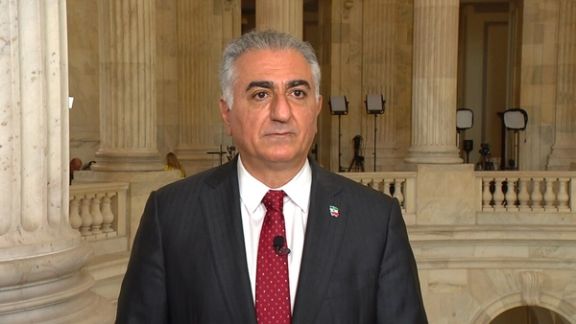
Iran's exiled Prince Reza Pahlavi says the way Western powers interact with the Islamic Republic has emboldened it to continue its repressive measures with greater immunity.

Iran's exiled Prince Reza Pahlavi says the way Western powers interact with the Islamic Republic has emboldened it to continue its repressive measures with greater immunity.
“While the Islamist regime in my country and the assailant it appears to have inspired bear responsibility for this attack, they were enabled by Western policy makers,” he wrote.
In the late 1980s and early 1990s, the United Kingdom and Germany cut relations with Iran, sending a strong message, Pahlavi said.
“This forced the Islamic Republic to keep a low profile. British and German citizens were largely safe from its machinations. The strong response from the West didn’t change Tehran’s destructive desires, but it did contain them,” he said, highlighting that now it appears “Western powers on both sides of the Atlantic have forgotten the lessons that kept their citizens secure as well as the dissidents to whom they offered a haven.”
He said although the Islamic Republic has not changed its revolutionary principle, it is now “accepted at glitzy panels at international forums and attend headline-grabbing negotiations at Europe’s chicest hotels.” That acceptance has afforded the regime unprecedented and undeserved moral equivalency with the West and has fostered confidence among Tehran’s radical followers who see the regime as a source of revolutionary inspiration to radical action, Pahlavi said.
The negotiations with Washington over a new nuclear deal in Vienna have shown “Khamenei and his criminal cabal” that they can effectively get away with murder, he said.
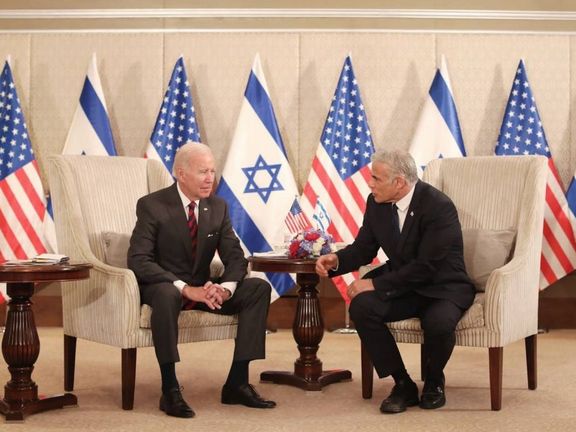
Senior Israeli officials have called on US and European leaders to leave talks with Iran on returning to the 2015 nuclear deal.
While Jerusalem believes Iran is close to inking an agreement with world powers, and has started preparing for the announcement of the deal, top Israeli officials said on Thursday that the time has come for Western powers to walk away from talks.
“The Europeans sent Iran a final offer, which doesn’t even meet the demands that the Americans committed to, and established that this offer was ‘take it or leave it,'” said a senior Israeli official at the highest level of decision-making on Thursday, adding that “Iran turned down the offer, and the time has come to get up and walk away.”
“Anything else sends a strong message of weakness,” the official added.
The unnamed senior official, in a briefing to Israeli journalists, also said that the world must now discuss what must be done in order to prevent Iran from abtaining a nuclear weapon.
Earlier on Thursday, Prime Minister Yair Lapid expressed this message in his phone call with German Chancellor Olaf Scholz. He also made the case to US Ambassador Tom Nides, and Florida congressman Ted Deutch, the chairman of the House Subcommittee on the Middle East, North Africa and Global Counterterrorism.
Israel’s National Security Adviser Eyal Hulata will head to Washington, DC, next week to conduct a series of meetings with US officials on the Iran nuclear program.

An Iran-backed hacking group has been targeting Israeli shipping and maritime organizations for the past few years, leading US cybersecurity firm Mandiant has confirmed.
Attackers began threatening maritime commerce in 2020 as the Israel-Iran shadow war increasingly began to play out at sea after mainly being waged on land and in the air, the Virginia-based company said on Wednesday.
The hacking group focused on collecting intelligence from Israeli entities and has also targeted Israeli government, energy and health care organizations.
The company wasn’t clear how successful the hackers had been in their attacks but warned that the intel and data obtained by the Iran-backed group could be leveraged for activities such as damaging leaks or guiding military action.
The shipping industry and the global supply chain are particularly vulnerable to disruption, especially in places where a state of low-level conflict already exists,” John Hultquist, the vice president of threat intelligence at Mandiant, said in a statement, adding that This is a reminder that global companies face global threats. Iran’s cyberconflict with Israel threatens Israel and those who operate there.”
Late in June,Israeli Defense minister Benny Gantz said Iranian Revolutionary Guard conducted research to damage ships, gas stations and industrial plants in several countries including Britain, the US, France and Israel.
Gantz hinted that Israel -- which is widely believed to have waged cyber war against Iran's nuclear facilities and other infrastructure -- may retaliate physically against enemy hackers.
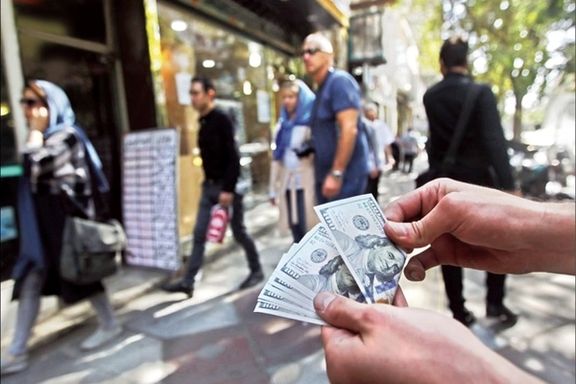
Iran’s government will announce new regulations and act to stem the tide of large and sustained capital flight, the economy minister announced Thursday.
Iran continues to face oil export and international banking sanctions imposed by the United States and a considerable chunk of its foreign currency revenues are invested abroad by those who make money in the beleaguered economy.
Estimates range from 10-15 billion dollars of capital leaving Iran every year, while the country has been under various sanctions for more than 10 years since 2010. Its oil income dwindled from a $100 billion in 2009-2010 to less than $20 billion in 2019, derailing all development plans and creating huge budget deficits.
When the United States withdrew from the Iran nuclear deal in 2018 and re-imposed sanctions, some reports spoke of around $30 billion leaving the country during that year by people who lost confidence in the economy.
The Minister of Economy and Treasury Ehsan Khandouzi says the government and the Central Bank of Iran (CBI) will come up with solutions to reduce capital flight, although he has not explained how.
Iranian businesses and individuals use at least two methods to either take capital out or keep their earnings abroad.
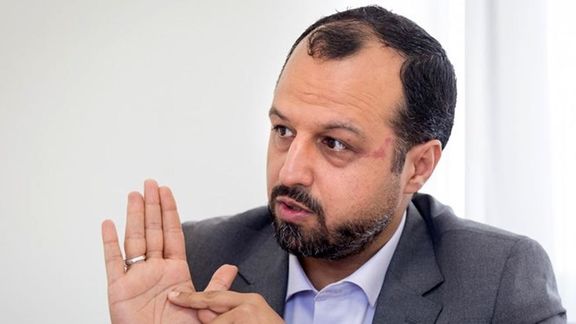
The first pertains to those who have legitimate export or import businesses and receive government dollars at preferential rates, to buy raw materials abroad. There have been accusations that some of that money sent abroad to finance imports, is diverted to foreign bank accounts or invested in other countries. Another loophole is that exporters who are supposed to bring their earnings back do so only partially and keep the rest abroad.
Another way is simply buying dollars and other foreign currencies on the black market and sending it abroad through a very fast, flexible, reliable and cheap informal network of money changers – much like the famous ‘hawala’ system well known in West Asia. One could give a million dollars to a money changer in Tehran and for a fee the funds will be delivered to any foreign country.
Khandouzi told the local media that during the past Iranian calendar year, (March 2021-March 2022) the country’s capital account deficit reached $7.5 billion, a red flag indicating capital flight.
To put in perspective, if Iran would earn $40 billion from oil exports amid US sanctions and $10 billion left the country as fleeing capital, one could argue that foreign earnings were in fact 25 percent less.
It should also be noted that Iran attracts virtually no foreign capital or investments, due to uncertainties and instability generated by its tense foreign relations and the nuclear dispute with the West.
Some of the foreign currency leaving Iran is invested by individuals to buy homes, primarily in Turkey. According to official Turkish government figures, Iranians bought more than 10,000 residential units in 2021. If the average price of each unit was $150,000, Iranians spent $1.5 billion on housing investments in Turkey alone. They also buy homes in the United Arab Emirates, Europe, Canada and the United States.
Among these people many must be government officials or work closely with the government, given the fact that 80 percent of Iran’s economy is owned by the state, quasi-governmental entities and foundations controlled by the ruling elite.
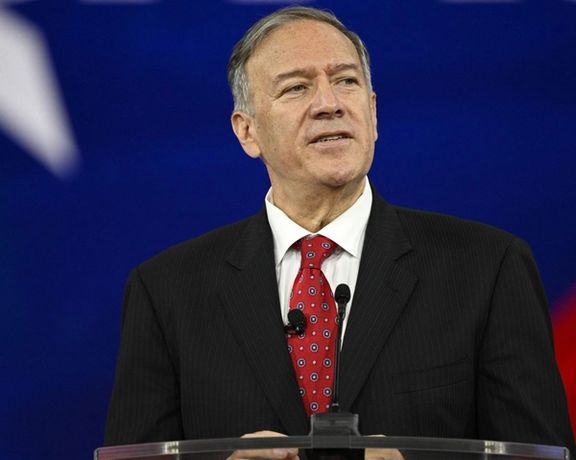
Former secretary of state Mike Pompeo has joined the chorus of US officials who have called on the Biden administration not to allow Iran’s president to enter the US for the UN General Assembly.
Pompeo, who was one of the main targets of a newly-revealed assassination campaigns by Iran, told the Washington Free Beacon that the Biden administration is setting a dangerous precedent by permitting Ebrahim Raisi -- who is on the US and European sanctions list -- into the US to attend UN ceremonies next month following his repeated threats against the US.
"We worked for four years to deny Iranian terrorists the freedom to put Americans at risk. This administration is allowing them to come to New York City while actively engaged in efforts to kill Americans on US soil. The Iranians just recently sponsored an attack that was almost successful in killing an American in that very city. We can do better," Pompeo said, referring to the Justice Department charges against a member of the Revolutionary Guard (IRGC) for an alleged plot to kill former national security advisor John Bolton and Pompeo.
Nikki Haley, the former ambassador to the United Nations during the Trump administration, also criticized the UN for providing a megaphone to the world’s top sponsor of terror.
"This shows just how corrupt and broken the UN is. Even when Iranian terrorists try to assassinate our officials, on our soil, the UN welcomes them with open arms and lets them give a speech," she said.
Earlier in the month, eight US Republican senators, including Tom Cotton, March Rubio, Joni Ernst and Ted Cruz, wrote to President Joe Biden asking him to deny the visa to Raisi.

Prolonged nuclear negotiations and its ebbs and flows have eroded Iranian social media users' sensitivity to the news about the talks, a new study has claimed.
According to Shargh daily in Tehran, a data analysis by Mohamad Rahbari indicates that numerous reports about the success or failure of negotiations have pushed social media users back and forth between hope and despair in the past 18 months. The report suggests that in recent weeks, despite more optimism surrounding the revival of the JCPOA, Iranian social media users have become less sensitive to news about the talks.
But the report does not cite figures from the past about the degree of interest in JCPOA to substantiate its claim of declining interest.
Iranian Twitter users posted some 22,000 tweets about the JCPOA from August 6-13. The data collected by Rahbari suggests that there was a rise in attention to the issue until Tuesday, August 9, followed by a decline. But as more optimistic reports started to come in, the number of tweets reached a peak of nearly 4,000 on August 13.
The report added that nonetheless, the JCPOA was not the top issue for Twitter users. A review of other political and economic reports during the week showed that a statement issued by former presidential candidate Mir Hossein Mousavi, which challenged Supreme Leader Ali Khamenei's authority, caught the most attention and the JCPOA was the second most important news.
While there were 22,000 tweets about the JCPOA, the Mousavi story generated 31,000 posts, and the Rushdie attack 15,000.
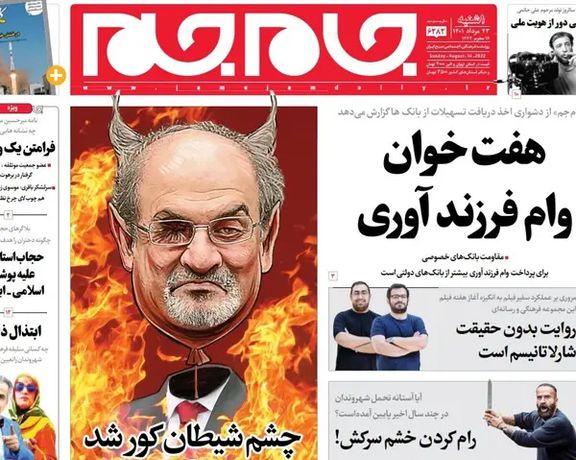
Meanwhile, although there were more tweets about the JCPOA than those about the assassination attempt on British author Salman Rushdie, the posts about Rushdie received more "likes" than those about the JCPOA.
Things, however, were different on Telegram channels where the news about the JCPOA attracted far more attention than the stories about Mousavi or Rushdie. Nonetheless, there were many more posts about the exchange rate of Iran’s currency, as the rial began to rise against the US dollar.
Here, the JCPOA was the subject of 53,000 posts, forex 95,000, with the rest below 20,000 each.
On the other hand, trends in Google searches which reflect people's preoccupations and questions more accurately, indicate that users showed the least degree of interest to the JCPOA and its revival. In other words, there were more searches about Salman Rushdie (yellow graph), subsidies (purple), Mousavi (red), and Forex and gold (green) than about the JCPOA and its revival (blue) [Figure 4]. This shows that a large number of Iranians who use Google search, were far less sensitive about the JCPOA than about other matters.

The research observed that most of the tweets about the JCPOA were not indicative of users' sensitivity to the matter. Instead, they mainly contained jokes about the negotiations. This was more evident in tweets that had received the largest number of "likes."
In the most popular tweet of this kind which received 3,476 "likes," user Massoud Saeedi, who pretended to be an Iranian government official wrote: "The text of the JCPOA had some problems we will not tell you about. We prepared a better text that you should not know about. However, we insisted on some conditions that we are not going to tell you about. Now an unidentified group of experts are reviewing the text, but we are not going to share with you the results of this review. You just need to know that we are better than the previous government."
The second most popular tweet observed that "The winner of the negotiations was the hotel that was the venue of the talks."
The report concluded that the reasons for the decline in sensitivity about the JCPOA include the extraordinarily prolonged duration of the talks and the attacks made on the deal during recent years by its Iranian and foreign opponents. Some Iranians may have concluded that the JCPOA may not be able to solve their problems.